Interview with Natasha Palesa Mothapo
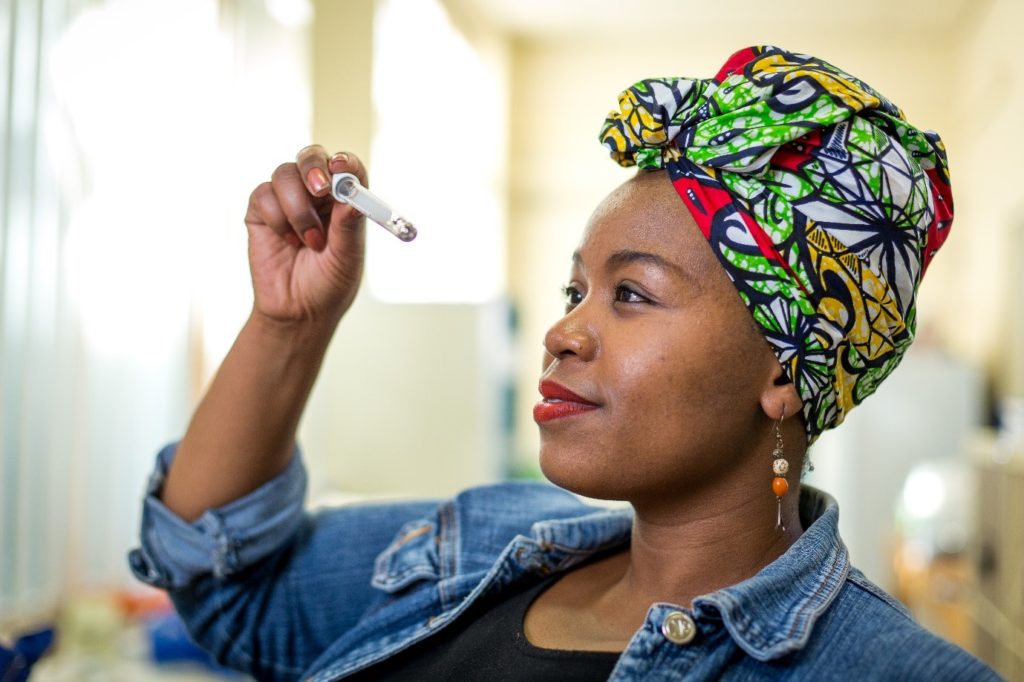
Natasha Palesa Mothapo grew up in Johannesburg (South Africa) and her academic career started with a physiological study on an invasive slug found on the sub-Antarctic Marion Island. She then changed the subject and got her MSc and PhD in Stellenbosch with her supervisor Theresa Wossler, who researches the behavioral ecology of the Cape honeybee. During her PhD, Natasha studied the behavioral ecology of the Argentine ant, as well as the community-wide impacts this ant has on the Fynbos and how the combined effects of interspecific competition and carbohydrate resource availability give the invasive Argentine ant leverage in displacing native ant species and facilitating their spread into pristine environments. In her postdoc project, Natasha investigated the mechanisms driving the disruption of seed dispersal mutualism between fynbos native ants and fynbos plants by Argentine ants, and how this has impacted the vegetation structure in the environment. Now, she works in a research management job at the university.
An Interview compiled by Emeline Favreau

MNB: Could you tell us a bit about yourself?
NPM: I started my research on Argentine ants, looking at the colony structure in South Africa, using behavioural and cuticular hydrocarbon recognition systems, understanding the pattern of distribution of the ants in the country, such as indigenous ant species responses to invasion. I was totally mesmerized first of all by how intelligent the invasive ants were, and they reminded me a lot of black people and colonization: The Argentine ants displace other ants, like humans colonize and displace other people. In my PhD, I really wanted to understand the recipient environment and how it behaves towards invasions. I realized that the native ants are not quite good at utilizing those resources (sugar, protein, etc.) while Argentine ants, when they find an abundant resource, they overexploit it, and they monopolize it, which are some of the strategies that the indigenous ants are not using. Then I looked at seed dispersal, the Argentine ants disrupt the seed dispersal by dispersing these keystone indigenous ants. So, in the long term, it changes the vegetation composition. I used quite a range of techniques to do that kind of study such as stable isotopes.
I also do a lot of science communication around me. I’m always talking about ants and people nicknamed me the ant queen!
MNB: Amazing! If you hadn’t become the ant queen, what would you have liked to become?
NPM: I initially wanted to do geology and paleontology. I also wanted to be a medical doctor, but I would not be happy to lose people. I’ve always wanted to do a PhD. My family never understood it because it’s not a normal thing: I am the first person to go to university in my family. In terms of career choices, I don’t think even now that I would change anything about the path that I ended up on. I’ve always liked animals, nature, and the environment. So somehow, I would have ended up somewhere here.
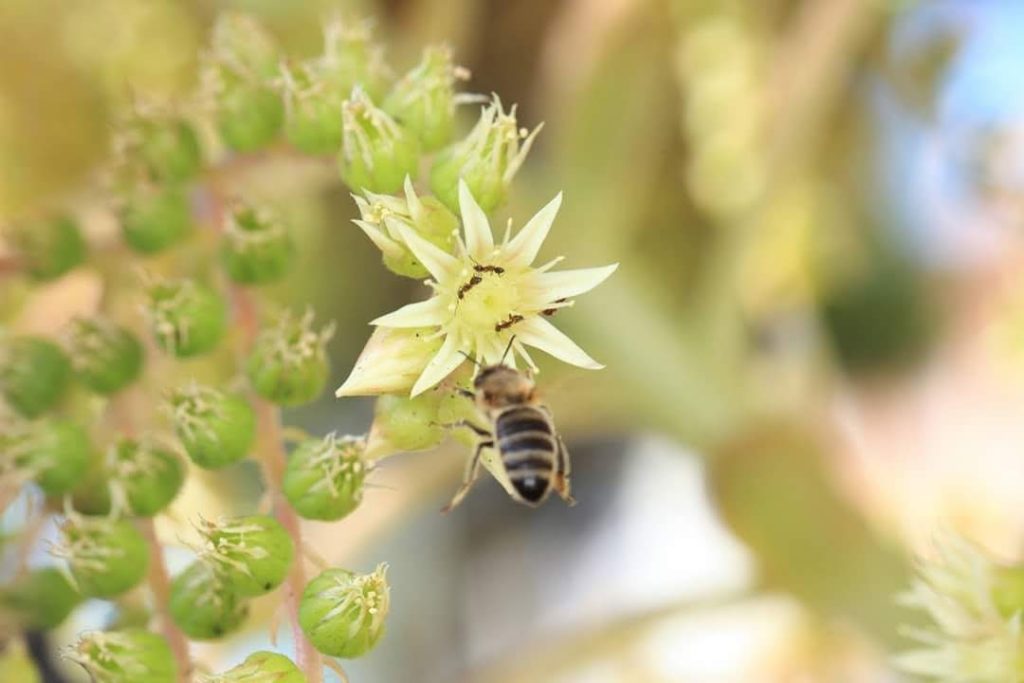
MNB: What’s your motivation for doing ant research now? What do you like the most about it?
NPM: I think it’s a growing field from the African perspective. We don’t have a lot of people working on ants or studying ant ecology or patterns. I think you get a lot of instant information from the responsiveness of insects to change, so if you want to see pollution, then go to an unpolluted area to collect insects there, and then come to a polluted area and collect the insects there and see what’s happening there. It is very easy and very simple to see.
I think ants are very good animal models to use to educate, especially kids, about the importance of protecting the environment. I love citizen science a lot. I use it as an educational tool and to educate about the environment. We went to schools in rural areas where kids don’t even understand what a myrmecologist or even a scientist is! People are scared about science, but actually, when they see how diverse it is under that blanket term, they become very excited.
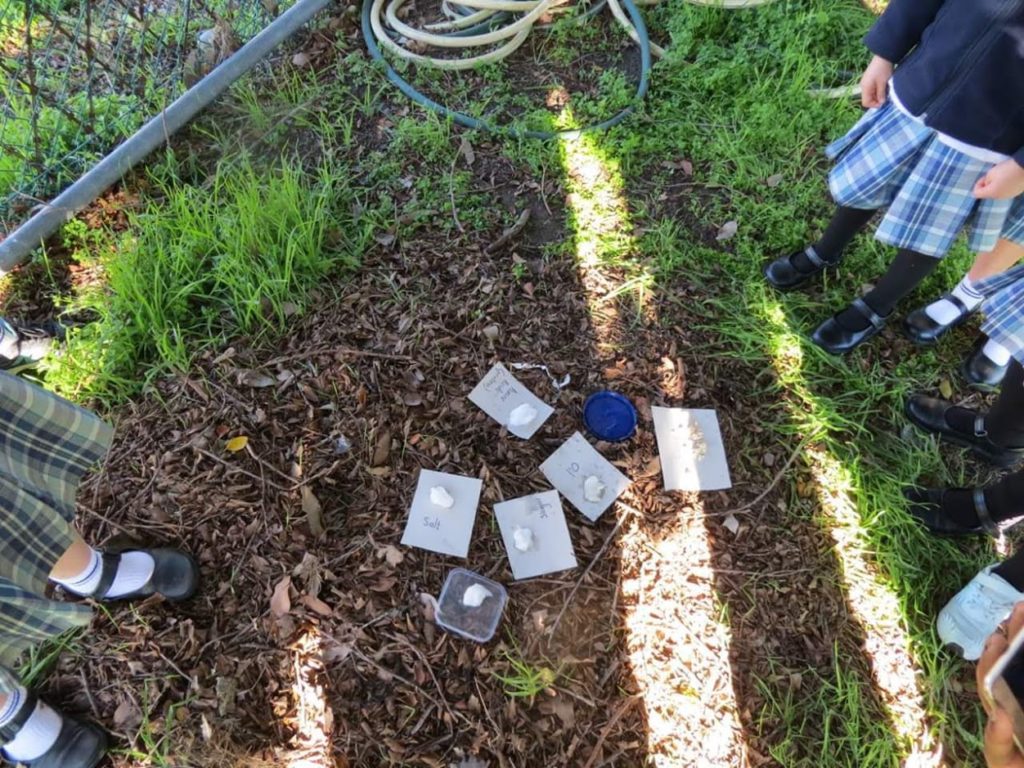
MNB: What was the biggest obstacle you had to overcome?
NPM: First to even study insects, as an African woman is not something that is seen as normal life. I think for me my personality allows me to do what would be considered a weird thing. This is how I am. I have to be a persistent person because it can be difficult to be from South Africa when a lot of ant specialists are old white males from Europe or America. My university is historically a white university, I was also the only black person in my zoology class. It’s very challenging, people aren’t always accepting, or they’re not seeing that you qualify to be there. The obstacle is more about acceptance.
I also had to learn taxonomy, because nobody has looked at the native ants. There are some specimens in the museum but there are not many people who are specializing in taxonomy here. So, I had to reach the expertise from all the way to Brian Fisher to get the resources that I needed. But I developed my skill, I practiced it all the time and now I can identify an ant with one eye.
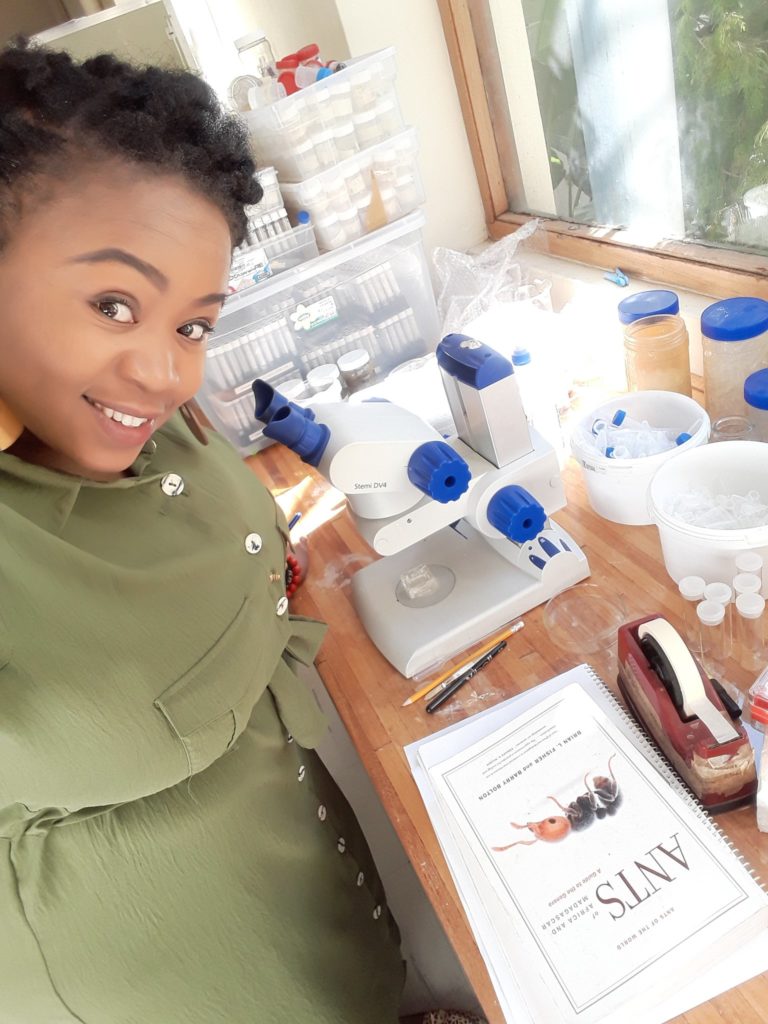
MNB: Is there anyone who has inspired you to pursue your career?
NPM: My supervisor empowered me so much because she was very passionate about honeybees, but she always made it clear that she was not the ant expert, that I had to learn and to educate her along the way. During my PhD, I had a question about hydrocarbons, so she said, “Oh I saw Neil Tsutsui, write to him and ask him”. So, I wrote to him, and he wrote me a really nice email back. He said, “Oh yeah, we are doing similar research, it would be good to see some aspects from your study and from our study.” Then, we actually organized a workshop in 2008 with all the people that I like. I was so happy! Everyone was so open. Although I was a master’s student, everyone was so open. And this openness was truly amazing and inspired me to stay in research. Everyone stayed in touch after the workshop. That meeting inspired me to want to learn more and was that first opportunity to get to know them. I got invited as an invited speaker to the symposium, it was very exciting for me and at the same time really challenging standing there and talk about my work with these guys who are like gurus. But this gave me the confidence and courage to trust that what I was doing was important knowledge, such as growing my skills, but also most important, getting knowledge that other researchers found worthy.
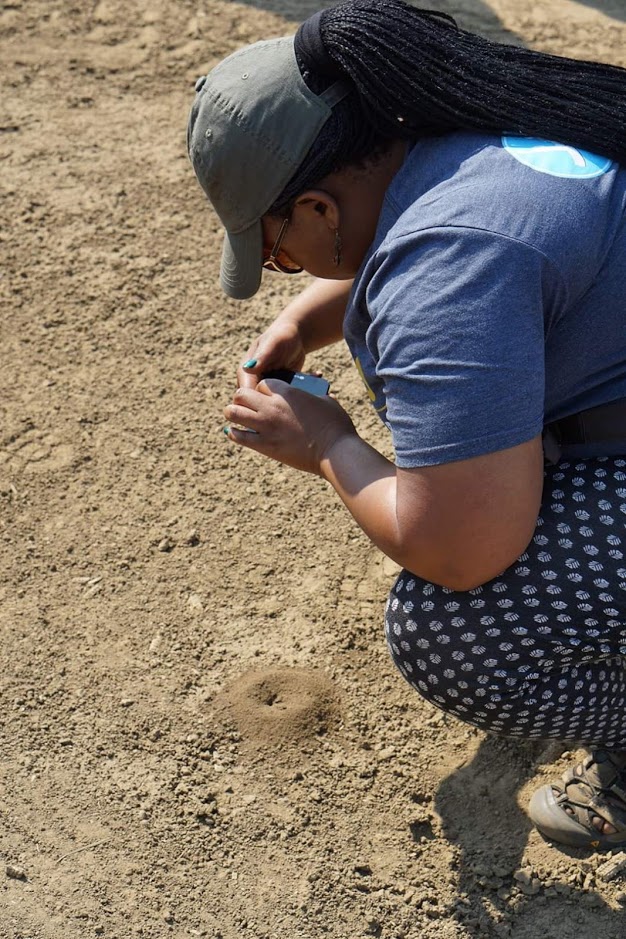
MNB: What would you do differently if you could start all over again?
NPM: Nothing! I am actually now in a very different kind of job. I did two postdocs in five years. Then I would not be getting a job in Academia. It’s very challenging, but I did many other things in between that, including academic leadership, science diplomacy, talking about science game awareness. Now I’m managing a postdoc support unit at the University. It’s a research management job, which is completely different from my research. I’m still so passionate about my research, I’m still at the lab all the time, I’m still writing, still go to the field sampling and it’s a part of my life that I feel I cannot cut off from myself. So I am managing all the postdocs, and especially around capacity development, because there are things that I could have benefited from during my time as a postdoc: teaching experience, supervision experience, grant writing; everything that prepare you not just for an academic career, but also outside of academia, to make an impact somewhere out there. I like people, so I like my work to have an impact on people.
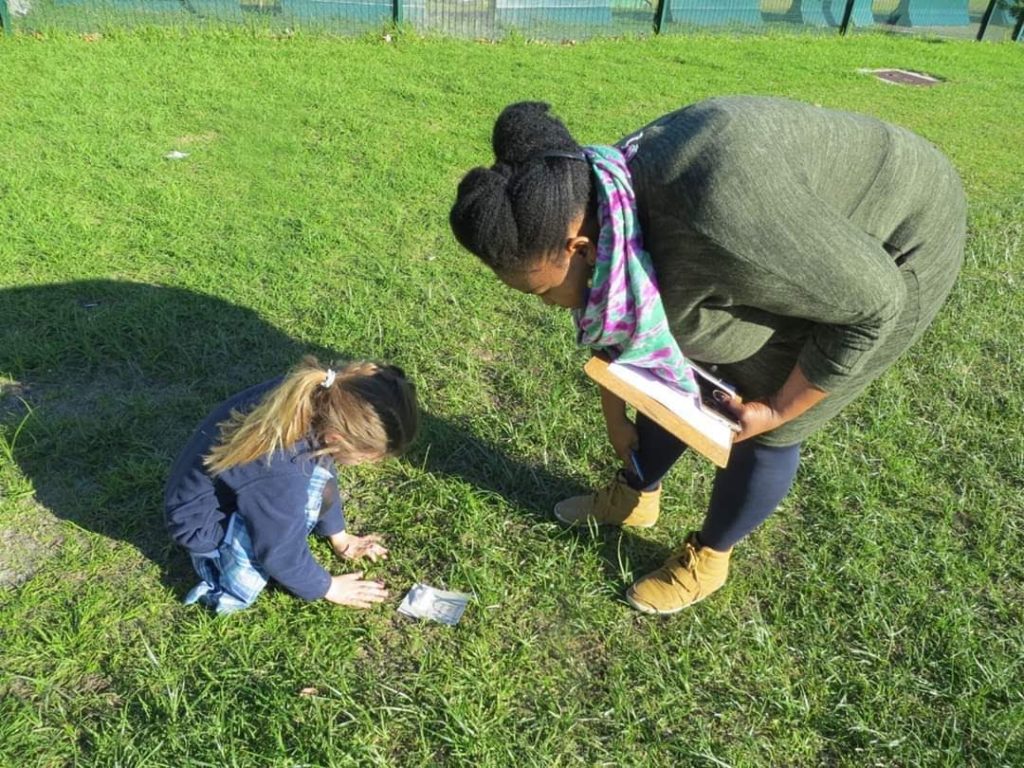
MNB: What was the funniest moment in your research?
NPM: There have been many [laughing]. I’ll tell you two.
The first funny story is when I went to collect Argentine ants in suburban areas with one of my collaborators, Grzegorz Buczkowski from Purdue University. He and I were doing a lot of pest management work around Argentine ants. He’s come here quite often. And one time in our field work we were busy collecting, and you know, you’re like digging the ants, bums in the air, looking weird. A policeman came and asked in Afrikaans to my male white collaborator “Hello, excuse me, what are you doing?” My collaborator is American, he doesn’t understand the language. The policeman stood in front of us, repeating his question in Afrikaans. My collaborator got up, looked at me. I looked at him. I understood exactly what the policeman was saying, but I just deliberately started digging again. The policeman said again “What are you doing? I’m going to get you arrested. Look up at me. I’m talking to you.” So, I just looked at him and said “He’s American. He doesn’t understand Afrikaans or anything else, only English.” And then he said “I just wanted to know what are you doing? I can’t understand why a man and a woman have their bums facing the road, and they’re digging. I just want to know what it is that you’re doing.” [laughing] He actually spent about two hours with us and listening the stories about ants, like a schoolchild, and got very passionate about everything that we were telling him.
The other story is about my parents, they never have understood what I’m doing. I tried to explain it to them. One day in June I was at home in Johannesburg. I had a kid’s TV show over making a mini-documentary on me as a scientist. The entire neighborhood of course came to see because there’s this television team outside. I have to walk in the street, to introduce myself and my neighborhood, because where I grew up is like an informal settlement, so people don’t usually see this. My mom was the proudest because I was going to be on TV, and she understood that I did a PhD, and that I’m the doctor for the ants. I’m not the doctor for the humans, I’m the doctor for the ants. So now she’s understood that and value my work. Then, if I wasn’t on TV she would still not understand what I’m doing.
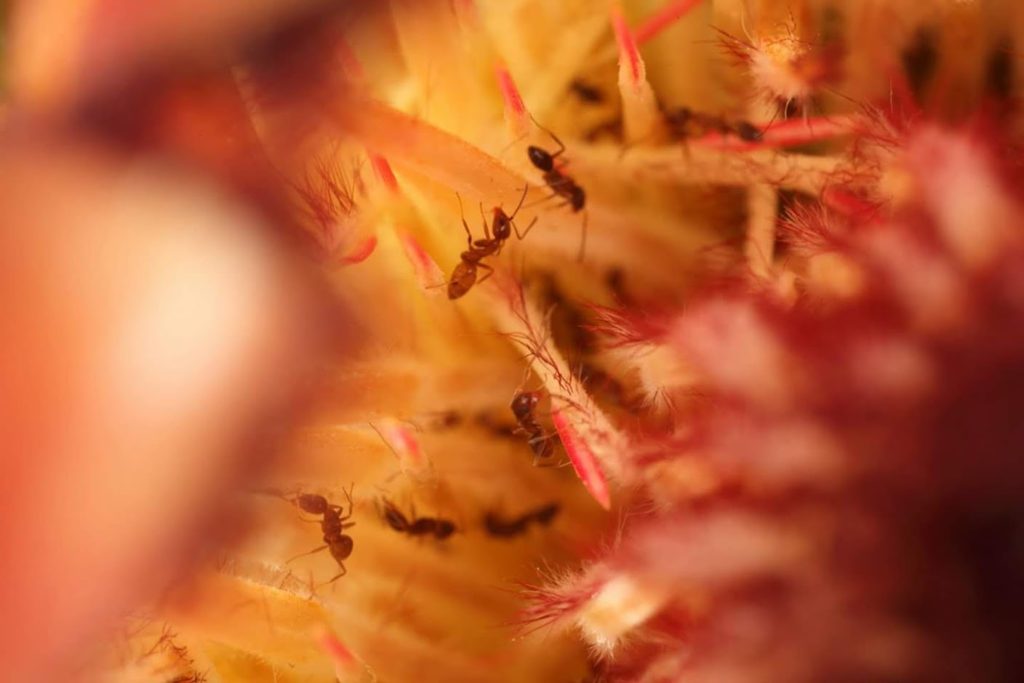
MNB: I love that you had to have the afternoon TV show coming to your house for your mum to realize you’re actually a doctor of ants [laugh]. How do you overcome difficulties in your work?
NPM: I implemented in my research this stable isotope analysis. I had built this food web structure for Argentine ants. But I just drew it from my field observations (e.g. setting traps, ant collections, etc). I went on a collaboration trip to Kobe University in Japan and attended their lab meetings focusing on insect brains and bee research. One of the researchers was showing this nutrient workflow of stable isotope in the fruit fly. I was inspired by this study and wanted to present my research, maybe this scientist could help me. Then I gave my presentation and then one of the researchers said to me, “Oh, yeah, you can actually look at the flow of the sugar nectar from the flowers and track it to the colony”. But I wanted to know the type of resources that the native and invasive ants used (protein, sugar?) and relate that with the species abundance, to understand how can some ants coexist with Argentine ants and some others don’t. He told me that I can use stable isotopes for that! When I did come back, I went to do a stable isotope course in Cape Town, I published that paper two years ago. I had to understand how it fits into my unique system.
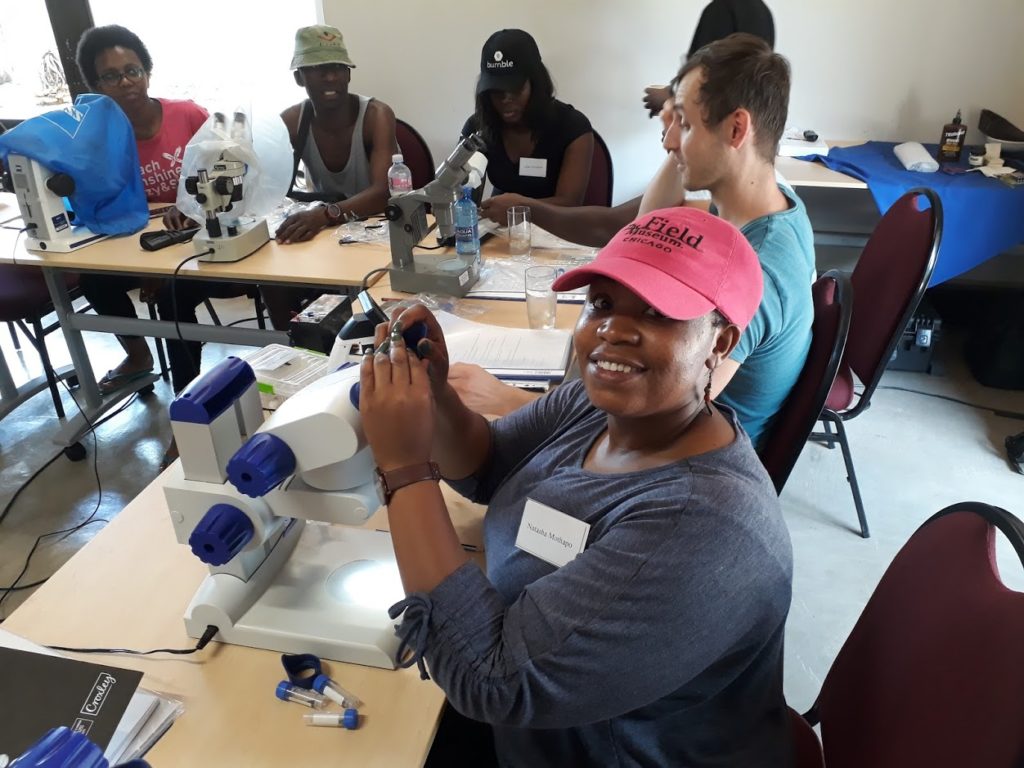
MNB: Which questions are you asked the most often when people hear you work with ants?
NPM: “Why?” and “How do you kill them?”
MNB: Is it one thing you would like everyone to know about ants?
NPM: You need to understand the ants and their role in the environment, they are not all pests!
MNB: Do you have a favorite ant species?
NPM: Oecophylla smaragdina, the Green Tree Ant – I’m getting a tattoo of it!
MNB: What is the book on your bedside table?
NPM: Homegoing by Yaa Gyasi
MNB: Watching sports or doing sports?
NPM: Watching sports.
NPM: Listening to music or playing an instrument?
NPM: Listening to music.
NPM: Do you enjoy the evening or the morning?
NPM: Both of them!
MNB: Tea or coffee?
NPM: Coffee.
MNB: What do you prefer: habit or change?
NPM: Change.
MNB: Cooking for yourself or going out to have dinner?
NPM: Cooking.
MNB: Aspirator or forceps?
NPM: Whoa, it depends on which ants I’m working with.
MNB: Do you prefer nest densities or pitfall traps?
NPM: Pitfall trap.
MNB: Fieldwork or lab work?
NPM: Fieldwork.
MNB: Pin or ethanol?
NPM: Pin. It’s relaxing with music.
MNB: Paper printed out or reading on the laptop?
NPM: I had to really learn to change my habits. So, I’m trying very much to do the reading on the laptop.
MNB: Journals financed by the author (open access) or reader subscription-based. What do you prefer?
NPM: Subscriptions are limiting for people who cannot afford to, so I would opt for open access.
MNB: Kin selection or group selection?
NPM: I think group selection because we live in a world with different people with different genetic makeups, but we live together. So, we need to think in a group form.
MNB: Do you prefer monodomy or supercolony?
NPM: Supercolony
MNB: Do you prefer workers or queens in an ant colony?
NPM: I prefer workers because I think queens only do a small subset, and they’re not so interesting.
MNB: Fair point. It’s been very interesting and entertaining to hear your stories, thank you very much for sharing!


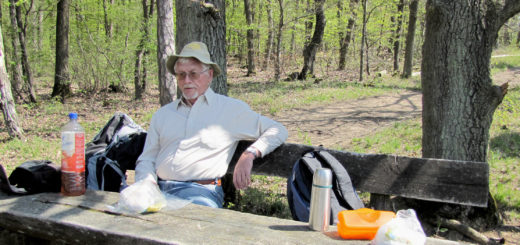
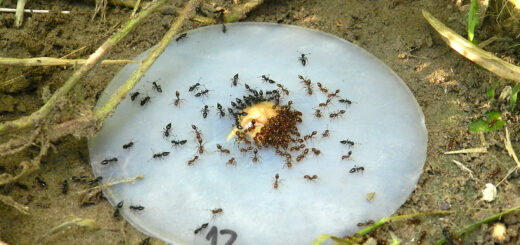
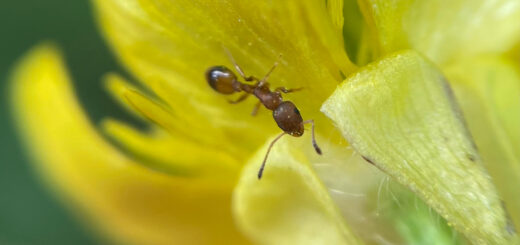
Recent Comments